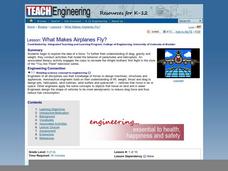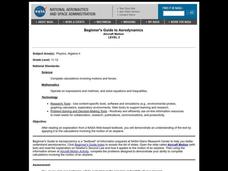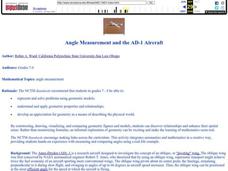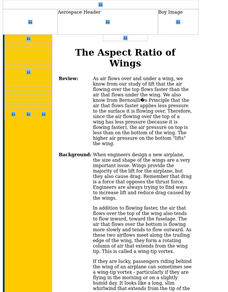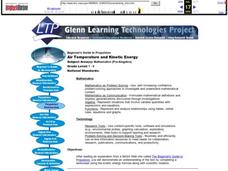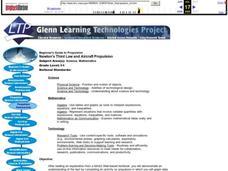Curated OER
Principles of Flight: Flying Paper Airplanes
Students investigate ways to enhance an object's flying ability. In this model construction lesson plan, students construct two paper airplanes, one of which is twice as big as the first. Students compare and contrast the two...
Teach Engineering
Equal and Opposite Thrust in Aircraft: You're a Pushover!
It's the law—every action requires a reaction, no matter how small. Pupils experience two demonstrations of Newton's third law of motion as it relates to thrust in the 10th segment of a 22-part unit on flight. Using their mathematical...
Curated OER
Symmetry in Paper Airplanes
Students explore symmetry. In this geometry and scientific inquiry activity, students design paper airplanes with middle line symmetry, as well as right, obtuse, and acute angles. Students measure the plane's angles using a...
Teach Engineering
May the Force Be With You: Thrust
Force the plane through the air. The lesson introduces the force on an airplane that makes it go forward. Pupils learn how Newton's laws of motion apply to flight in the eighth segment of a 22-part unit on flight.
Curated OER
What Makes Airplanes Fly?
Students examine force and conduct activities that model parachutes and helicopters. In this airplanes lesson plan students identify the forces that make airplanes fly higher and land.
Curated OER
Trimmed Aircraft
Students, after reading an explanation from a NASA Web-based textbook, demonstrate an understanding of the text by applying it to the calculations involving the motion of an airplane.
Curated OER
Aircraft Motion
Students, after reading an explanation from a NASA Web-based textbook, demonstrate an understanding of the text by applying it to the calculations involving the motion of an airplane.
Curated OER
Aircraft Motion
Students, after reading an explanation from a NASA Web-based textbook, demonstrate an understanding of the text by applying it to the calculations involving the motion of an airplane.
Curated OER
Principles of Flight: Where are We?
Students explore the concept of topographical maps. In this topographical map lesson, students discuss how airplanes know where to fly. Students use topographical maps to simulate a field trip on the computer.
Curated OER
The "Wright" Puzzle
A crossword puzzle based on the lives of the Wright brothers. Students research on their own or in small groups several brief biographies of the Wright brothers.They complete a crossword puzzle based on their reading.
Kenan Fellows
Weight and Balance of an Airplane
A career in aeronautics might be calling your class members. Building from the previous two lessons in the series, learners continue analyzing the mathematics of aeronautics. Groups create a paper airplane using paperclips for balance....
Curated OER
GPS Scavenger Hunt
Students go on a GPS scavenger hunt. They use GPS receivers to find designated waypoints and report back on what they found. They compute distances between waypoints based on the latitude and longitude, and compare with the distance the...
Kenan Fellows
Reading Airline Maintenance Graphs
Airline mechanics must be precise, or the consequences could be deadly. Their target ranges alter with changes in temperature and pressure. When preparing an airplane for flight, you must read a maintenance graph. The second lesson of...
Curated OER
Aircraft Trajectory Problem Set
Learners, after reading an explanation from a NASA Web-based textbook, demonstrate an understanding of the text by applying it to the calculation of speed, distance, acceleration, and time in simple aircraft motion.
Curated OER
Angle Measurement and the AD-1 Aircraft
Students represent and solve problems using geometric models and apply geometric properties and relationships. They also practice constructing and measuring angles. By constructing, drawing, visualizing, and comparing geometric figures...
Curated OER
Angle Measurement of Aircraft Wings and Tails
Learners measure the angles of wings and tails of various aircraft using a protractor. They estimate and check their measurements. They investigate aircraft being developed and tested at NASA Dryden.
Curated OER
Aircraft Trajectory Problem Set
High schoolers read text from a NASA Web-based textbook then demonstrate an understanding of the text by using it to complete an activity on aircraft trajectories.
Curated OER
The Aspect Ratio of Wings
Junior engineers examine aspect ration in airplane wings. Using the length and width of two differetn wings, they calculate the aspect ratios and compare drag rankings. An engineering or space science class would benefit from this lesson...
Curated OER
Air Temperature and Kinetic Energy
Students use a NASA website do activities which help them better explain how air temperature and kinetic energy are related to aircraft propulsion.
Curated OER
Converting Units and the SR-71
Students practice solving problems logically. Using the internet, students observe pictures and facts about the SR-71 Blackbird. They convert statistics about the aircraft. Students explore terms of flight and convert them to everyday...
Curated OER
Make a Model of a Wright Flyer
Students recreate a model of the 1903 Wright Flyer out of Styrofoam. Students practice following instructions, and discover information about the Wright brothers' engine-powered glider.
Curated OER
Up, Up, and Away
Students investigate the laws of physics that govern the flight of helicopters and airplanes. They build and launch a model rotor, simulating rotors used on helicopters to provide lift.
Curated OER
Newton's Third Law and Aircraft Propulsion
Students research propulsion, graph data, and interpret the results.
Kenan Fellows
Introduction to a Flight Computer
Keep your hands on the wheel—at all times! Scholars learn why pilots use a flight computer through a high-flying demonstration. Making calculations for speed, distance, or time is automatic if you know how to use a flight computer.






